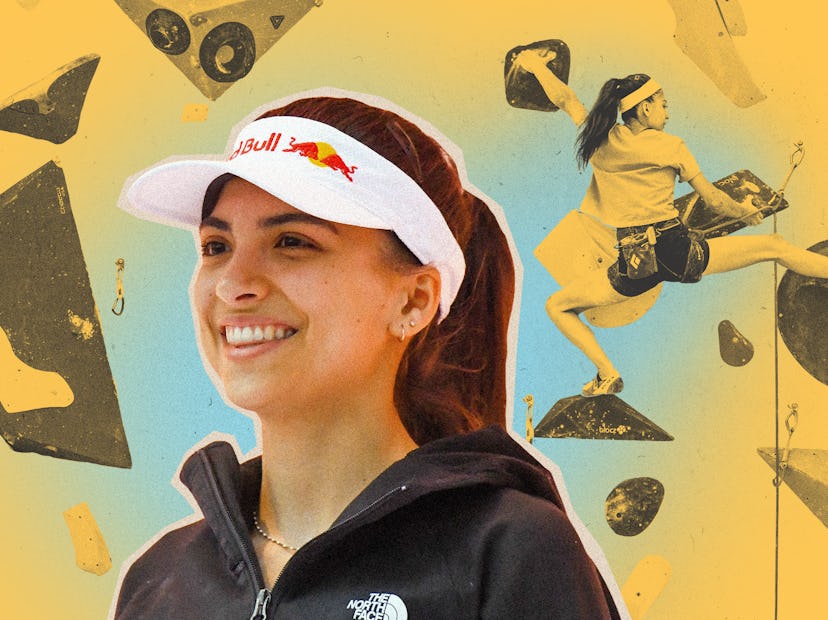2024 Olympics
How This 22-Year-Old Professional Climber Uses Psychology To Train
Natalia Grossman gave us the inside scoop on her best training tips.

At 22 years old, Natalia Grossman is already one of the most decorated professional climbers in the world. Her track record of successes includes winning gold and silver at the 2021 IFSC Climbing World Championships, 19 podium finishes at World Cup events, and a qualifying ticket to the 2024 Olympic games. As a Latina, she looks forward to representing Mexican-American women in a male-dominated space where she’s no stranger to competition. In fact, when put to the test, she typically dominates.
Achieving such a high level of success at a young age may trick you into thinking she was born into the spotlight, but the accomplished climber didn’t hit success overnight. Grossman has been climbing since the age of six — as soon as her local gym in Santa Cruz, California, allowed her to participate.
“I got into climbing because we happened to live a few blocks away from a climbing gym, and one day I noticed this really tall building while walking around,” Grossman explained. “We went inside and checked it out, and right away, I wanted to climb — but I was only four at the time, and the age minimum was six. My parents said, ‘If you still remember in two years, we can come back.’”
Grossman remembered, and her parents made good on their promise once she turned six. Once in the gym, her talent and natural affinity for the sport was quickly discovered. By the time she was 14, her family made the move from Santa Cruz, California to Boulder, Colorado so she could train with a competitive youth team and take her interest in climbing to the next level (literally).
It was really cool to hit that quote-unquote rock bottom, take a step back, reassess... and then end up winning.
Today, climbing is way more than a hobby — it’s her job. She trains every day, has scored a sponsorship with Red Bull, and regularly competes on a national level. But, she remains mindful that she gets to do what she loves on a daily basis. Her undergraduate coursework in psychology at the University of Colorado, Boulder allowed her to utilize mindfulness practices and sports psychology tactics that have helped her stay present during particularly tough competitions and climbs.
“Trying to stay in the moment and focus on the climb right in front of me really helps me [during tough routes],” Grossman explained. “If I think about the future or the next step, that’s going to stress me out. If I think about the past, that’s going to impact the future.”
Zeroing in on the present moment has also allowed her to refocus when her training isn’t clicking. In the past, she admits falling into a trap of becoming overly concerned about outcomes, which caused her to overtrain and burn herself out. Before the World Championships in Switzerland this past summer, she admits she had been overtraining, ultimately showing up to the competition exhausted and unable to perform her best. It affected her mentally and physically, leading to disappointing results.
“I didn’t feel super excited to be there, and overall, it was one of my worst performances,” Grossman admits.
Competing for Team USA allows me to show other girls that Hispanic people can excel at a sport, even when no one around them looks like them.
Fortunately, after some reflection post-competition, Grossman was able to turn things around. This meant cutting her training time nearly in half to focus more on recovery. To reverse her burnout, she also incorporated more cross-training, sought out other hobbies outside of climbing, spent less time training, and made a concerted effort to spend less time even thinking about climbing.
Her approach proved successful when she won gold at the Pan American Games this past fall, which led to her qualifying her for the 2024 Paris Olympics. Now, she looks back at her low moment as a learning opportunity.
“It was really cool to hit that quote-unquote rock bottom, take a step back, reassess, make changes for the Pan Am competition, and then end up winning,” Grossman said. “It taught me how much small changes can make a difference.”
Grossman has dreams beyond climbing, which include completing her masters in psychology, and opening up her own psychiatric practice one day. But first up is the Paris Olympics, where she’ll be competing on behalf of Team USA.
My biggest advice to young girls who want to climb professionally is to just have fun with what they’re doing, and listen to their bodies.
Grossman is ecstatic to represent the U.S. and be part of a bigger, supportive team. She’s also excited to represent Latina athletes on a global scale. It was rare for her to see other Latina athletes in the gym as a young climber, so she recognizes the importance of being the representation she once craved seeing.
“Competing for Team USA allows me to show other girls that Hispanic people can excel at a sport, even when no one around them looks like them,” Grossman said.
Until the Olympics this summer, Grossman is enjoying taking some time off and doing more climbing outdoors. She calls it a ‘mental raincheck’ from training, and recommends all athletes find some way to unwind during their offseason. Perhaps her best advice to others is some that she also gives herself often: “If you’re tired, take a rest day.”
“My biggest advice to young girls who want to climb professionally is to just have fun with what they’re doing, and listen to their bodies.”